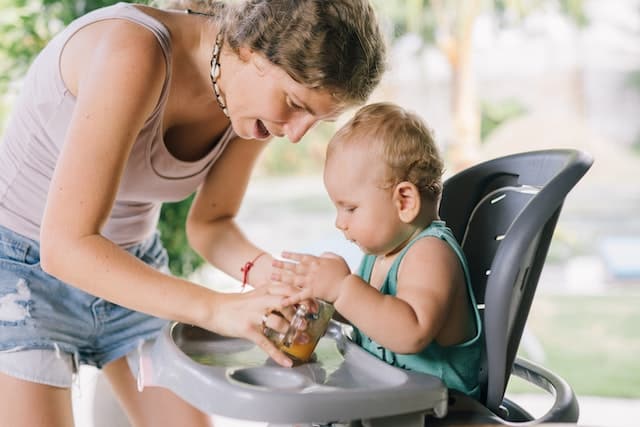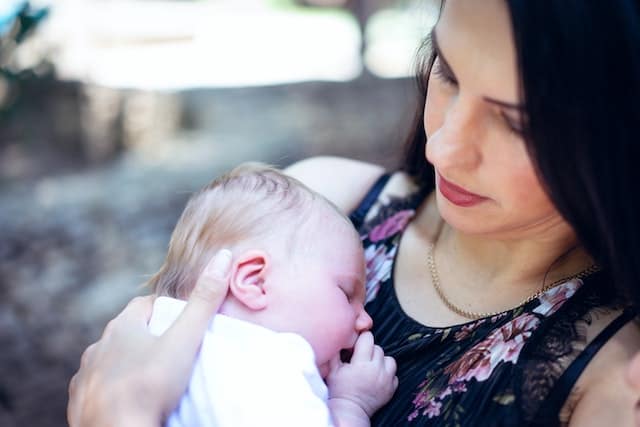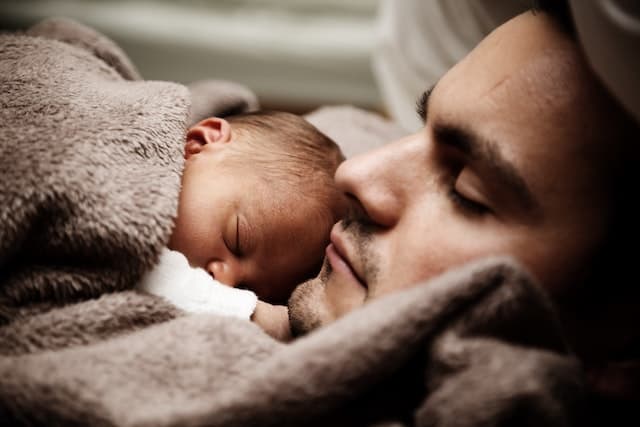Babies have a unique way of communicating their needs and wants, and it is essential for parents to understand their behavior. One of the common behaviors that babies display is rubbing their face on their chest.
This behavior can be confusing for new parents, who may wonder what it means and if it is a cause for concern.
As babies cannot communicate their needs verbally, they use body language to express themselves. Rubbing their face on their chest is one of the ways babies communicate their needs. This behavior can indicate various things, such as hunger, tiredness, or discomfort.
Baby Rubbing Face on Chest: What Does It Mean?
Rubbing their face on their chest can indicate that the baby is hungry and needs to be fed. It can also mean that the baby is tired and is trying to soothe themselves to sleep. In some cases, it can indicate that the baby is experiencing discomfort, such as teething pain or an ear infection.
Key Takeaways
- Rubbing face on chest is a way babies communicate their needs.
- It can indicate hunger, tiredness, or discomfort.
- Parents should pay attention to other cues to determine the cause of the behavior.
Understanding Baby’s Behavior

Babies are known for their active and often unpredictable behavior. One common behavior that parents may observe is their baby rubbing their face on their chest.
This behavior is a normal and natural part of a baby’s development and can be seen as an indication of their motor skills and communication abilities.
When a baby rubs their face on their chest, it is often a sign that they are exploring their environment and developing their motor skills. This behavior can help babies learn how to control their head movements and develop their neck muscles. It can also help them learn about different textures and sensations.
In addition to being a sign of motor development, rubbing their face on their chest can also be a form of communication for babies. This behavior can be seen as a way for babies to express their needs or desires. For example, a baby may rub their face on their chest when they are hungry or tired.
It is important for parents to understand that this behavior is normal and should not be a cause for concern. However, if a baby is rubbing their face excessively or seems to be in discomfort, it is always a good idea to consult with a pediatrician.
Overall, understanding a baby’s natural behavior can help parents better care for their child and provide them with the support they need to develop and grow.
Baby Rubbing Face on Chest: What Does It Mean?
Babies often exhibit various behaviors that can leave parents puzzled and wondering about their meaning. One such behavior is when a baby rubs their face on their chest. This behavior is quite common in infants and can occur for a variety of reasons.
One reason why a baby may rub their face on their chest is that they are tired or sleepy. Rubbing their face against their chest can be a way for them to self-soothe and comfort themselves. It can also be a sign that they are trying to get comfortable and settle down for a nap.
Another reason why a baby may rub their face on their chest is that they are seeking comfort. Babies often find comfort in the scent and warmth of their parents, and rubbing their face on their chest can be a way for them to feel close to their caregiver.
Face rubbing can also be a sign that a baby is experiencing discomfort or pain. They may be rubbing their face on their chest to try and alleviate the discomfort they are feeling. It is important to observe other signs of distress, such as crying or fussing, to determine if this is the case.
In conclusion, a baby rubbing their face on their chest can mean a variety of things, including tiredness, seeking comfort, or experiencing discomfort. It is important to observe other signs and behaviors to determine the reason behind this behavior.
Common Reasons for Baby Rubbing Face

Babies rub their faces for various reasons, some of which are normal and others that may require attention. Here are some common reasons why babies rub their faces:
Tiredness
When a baby is tired, they may rub their face as a way to self-soothe. This is especially common when the baby is trying to fall asleep or is waking up from a nap.
Hunger
Babies may rub their faces when they are hungry as a way to communicate their needs. This is often accompanied by other signs of hunger, such as rooting or sucking on their hands.
Rooting Reflex
The rooting reflex is a natural instinct that babies are born with. It is the reflex that causes a baby to turn their head and open their mouth when something touches their cheek. Babies may rub their faces as a way to activate this reflex and signal that they are hungry.
Discomfort
If a baby is uncomfortable, they may rub their face as a way to relieve the discomfort. This could be due to a dirty diaper, tight clothing, or an uncomfortable sleeping position.
Fussy
Babies who are feeling fussy or overwhelmed may rub their face as a way to self-soothe. This is often accompanied by other signs of fussiness, such as crying, arching their back, or clenching their fists.
Itch
Babies may rub their face if they have an itch. This could be due to dry skin, eczema, or an allergic reaction.
Eczema
Eczema is a common skin condition that can cause dry, itchy patches on the skin. Babies with eczema may rub their face as a way to relieve the itching.
Allergies
If a baby has an allergy, they may rub their face as a way to relieve the itching or discomfort. This could be due to an allergy to food, pollen, or other environmental factors.
Teething
Teething can be a painful process for babies, and they may rub their face as a way to relieve the discomfort. This is often accompanied by other signs of teething, such as drooling, chewing on objects, and irritability.
In summary, there are many reasons why babies may rub their faces. While some of these reasons are normal and nothing to worry about, others may require attention from a healthcare provider.
If you are concerned about your baby’s face rubbing behavior, it is always best to consult with a healthcare professional.
How Babies Communicate Their Needs

Babies are unable to communicate verbally, so they rely on nonverbal cues to express their needs. These cues can include crying, yawning, fussing, biting, alertness, drooling, and excessive crying.
By paying attention to these cues, caregivers can better understand what the baby needs and respond appropriately.
Crying is the most common way that babies communicate their needs. It can indicate hunger, discomfort, pain, or a need for a diaper change. Yawning can indicate that the baby is tired and needs to sleep.
Fussing can indicate that the baby is uncomfortable or in pain. Biting can indicate that the baby is teething and needs something to chew on.
When a baby is alert, it means that they are awake and aware of their surroundings. This is a good time to engage with the baby and provide stimulation.
Drooling can indicate that the baby is teething or that they are producing excess saliva. Excessive crying can indicate that the baby is in pain or discomfort and needs attention.
It is important for caregivers to pay attention to these nonverbal cues and respond appropriately. By doing so, they can help the baby feel safe, secure, and understood. This can also help build a strong bond between the caregiver and the baby.
Feeding and Baby Rubbing Face
During feeding, it is common for babies to rub their faces on their parent’s chest. This behavior is often seen during breastfeeding, but it can also occur during bottle feeding.
When a baby rubs their face on their parent’s chest, it can indicate a few things. One possible reason is that the baby is seeking comfort and security. The act of rubbing their face on their parent’s chest can be soothing and calming for the baby.
Another reason for this behavior is that the baby is trying to find the nipple. Rubbing their face on the chest can help the baby locate the nipple and initiate breastfeeding. This behavior is more common in newborns who are still learning to breastfeed.
It is important for parents to be aware of their baby’s feeding cues and respond accordingly. If a baby is rubbing their face on the chest during feeding, it may be a sign that they need to burp or have hiccups. Taking a break from feeding and helping the baby burp can help alleviate discomfort and improve feeding.
In summary, baby rubbing their face on the chest during feeding is a common behavior that can indicate a need for comfort or a desire to find the nipple. Parents should pay attention to their baby’s feeding cues and respond accordingly to ensure a successful feeding experience.
Sleeping and Baby Rubbing Face

When babies are tired, they often rub their faces on their caretaker’s chest. This behavior is completely normal and can be a sign that the baby is seeking comfort.
Rubbing their face on a soft surface can help them feel secure and calm, which can make it easier for them to fall asleep.
It is important to note that this behavior is not a sign of any underlying medical condition. However, if the baby is rubbing their face excessively or seems uncomfortable, it may be a sign that they are experiencing discomfort or pain. In this case, it is important to consult with a pediatrician to rule out any medical issues.
To promote a comfortable sleeping environment for the baby, it is recommended to keep the room at a comfortable temperature and minimize any noise or light disturbances. Additionally, using a soft, breathable fabric for the baby’s bedding can help prevent irritation and promote a comfortable sleep.
Overall, rubbing their face on a caretaker’s chest is a common behavior for babies and can be a sign of seeking comfort. As long as the baby is not experiencing any discomfort or pain, this behavior is completely normal and should not be a cause for concern.
Baby’s Health Concerns Related to Face Rubbing
Face rubbing is a common habit among babies, but it can sometimes be a cause for concern. Here are some of the health concerns related to face rubbing in babies:
Skin Irritation
Frequent rubbing of the face against the chest or any other surface can cause skin irritation. This can lead to redness, dryness, and even rashes. To prevent this, parents should make sure that their baby’s clothes are soft and comfortable, and that they are changed frequently.
Reflux
Babies with reflux may rub their face against their chest as a way to relieve discomfort. Reflux occurs when the contents of the stomach flow back into the esophagus, causing heartburn and other symptoms. If a baby is rubbing their face frequently, it may be a sign of reflux, and parents should consult a doctor.
Infection
Rubbing the face against the chest or any other surface can also lead to infection. This is because the skin can become irritated and more susceptible to bacteria and viruses. Parents should make sure that their baby’s hands and face are always clean, and that they are not exposed to sick people.
Thrush
Thrush is a fungal infection that can occur in the mouth and throat of babies. It can cause white patches on the tongue and cheeks, and may lead to face rubbing as a way to relieve discomfort. Parents should consult a doctor if they suspect that their baby has thrush.
Fever
If a baby is rubbing their face and also has a fever, it may be a sign of illness. Parents should monitor their baby’s temperature and consult a doctor if it is above 100.4°F (38°C).
Vomiting
Babies who rub their face against their chest may also be prone to vomiting. This is because the pressure on the stomach can cause the contents to come back up. Parents should try to keep their baby upright after feedings to prevent vomiting.
In conclusion, while face rubbing is a common habit among babies, it can sometimes be a cause for concern. Parents should monitor their baby’s behavior and consult a doctor if they suspect that there is an underlying health issue.
Soothing Mechanisms for Babies
Babies often rub their faces on their caregiver’s chest as a way to self-soothe. This behavior is a natural response to feeling overwhelmed or overstimulated. Understanding the different soothing mechanisms available can help parents and caregivers provide comfort to their babies.
One common soothing mechanism is the use of a pacifier. Pacifiers can help babies self-soothe by providing a sense of comfort and security. However, it is important to note that pacifiers should be used with caution and under supervision to avoid any potential choking hazards.
Another way to soothe babies is through rocking. Rocking can help calm a fussy baby and provide a sense of security. This can be done by holding the baby and gently swaying back and forth or by using a baby swing or rocker.
Babies also find comfort in soft objects such as teddy bears or blankets. These items can provide a sense of security and familiarity for the baby. However, it is important to ensure that any objects placed in the crib are safe and do not pose a suffocation hazard.
Applying a cream or lotion to a baby’s skin can also provide a soothing effect. This can help moisturize dry or irritated skin and provide a calming sensation for the baby.
In conclusion, there are various ways to soothe a baby, including the use of a pacifier, rocking, soft objects, and creams. Parents and caregivers should observe their baby’s behavior and preferences to determine the most effective soothing mechanism for their child.
Understanding Your Baby’s Growth and Development
As a newborn, babies are still adjusting to the world outside of the womb. They are born with reflexes that help them survive, but they still need to develop coordination and strength to move their bodies purposefully.
During the first few weeks of life, babies may rub their face on their caregiver’s chest or clothing. This behavior is normal and can be a sign of a growth spurt. Babies may also be seeking comfort and security from their caregiver’s scent and touch.
Science has shown that babies can recognize their mother’s scent from amniotic fluid they were exposed to during pregnancy. This recognition can bring a sense of calm and security to the baby.
As babies continue to grow and develop, they will gain more control over their movements and be able to purposefully explore their environment. By understanding your baby’s growth and development, you can provide the necessary support and care to help them thrive.
Community Support and Baby Care
When it comes to caring for a baby who is rubbing their face on their chest, community support can be a valuable resource for parents. Many parents experience separation anxiety when leaving their baby, but having a supportive community can help ease these feelings and provide a sense of security.
Encouraging eye contact and touch can also be helpful in calming a baby who is rubbing their face on their chest. Parents can hold their baby close and make eye contact while talking or singing to them. This can help the baby feel more connected and secure.
In addition, ensuring that the baby is comfortable in their diaper can also help reduce face rubbing. Parents should check their baby’s diaper regularly and change it as needed to prevent discomfort.
Overall, with the help of a supportive community and attention to the baby’s needs, parents can provide effective care for a baby who is rubbing their face on their chest.
Related:
Frequently Asked Questions
How can I stop my baby from rubbing their face at night?
Babies tend to rub their faces when they are tired or sleepy. To prevent this, try to establish a sleep routine for your baby, such as a warm bath, a massage, and a story before bedtime. Also, make sure your baby is not too hot or too cold and that the room is quiet and dark.
Why do babies rub their face with their hands?
Babies explore the world around them with their senses, including touch. Rubbing their face with their hands is a way for them to feel the texture and softness of their skin. It is also a self-soothing behavior that helps them feel calm and secure.
What can I do to soothe my teething baby who is rubbing their face on me?
Teething can be a painful and uncomfortable process for babies. To soothe your teething baby, you can try giving them a teething toy or a cold washcloth to chew on. You can also gently massage their gums with a clean finger or offer them a pain reliever recommended by your pediatrician.
Is it normal for babies to rub their face into the mattress?
Yes, it is normal for babies to rub their face into the mattress as a way to self-soothe. However, it is important to make sure your baby is sleeping on a firm and flat surface to reduce the risk of suffocation or Sudden Infant Death Syndrome (SIDS).
What could be causing my baby to aggressively rub their face with their hands?
Aggressive rubbing of the face could be a sign of discomfort or irritation. Check if your baby is experiencing any allergies, skin irritation, or teething pain. If you notice any other symptoms such as redness, swelling, or a rash, consult your pediatrician.
Can teething cause babies to rub their eyes or face?
Yes, teething can cause babies to rub their eyes or face as a way to relieve the pressure and pain in their gums. However, if you notice any other symptoms such as excessive crying, fever, or diarrhea, consult your pediatrician.

Iesha is a loving mother of 2 beautiful children. She’s an active parent who enjoys indoor and outdoor adventures with her family. Her mission is to share practical and realistic parenting advice to help the parenting community becoming stronger.
